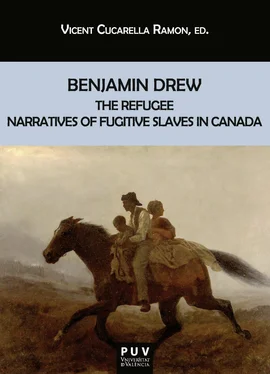The South-side View of Slavery says, “The gospel which is preached to them [the slaves], so far as I heard it, is the same gospel which is preached to us.” But the prayers of the slaves [p. 54 and 55] and the hymns they selected, [p. 55] Watts’ Ps. 51, Hymns 139, B. I. and 90, B. II., seem to confirm the view we have presented; while the address of the superintendent of the colored Sabbath school, [p. 85] by no means contradicts it: nor does the hymn sung by slaves [p. 212].
To magnify the benefits which incidentally and casually grow out of the system of slavery, and to represent them as vast enough to sink its direct enormities into comparative insignificance, is, as if a man were to point to an abundant harvest of corn, on the bloodenriched field of Waterloo, as a sufficient reason for involving the world in the horrors of war.
If, as we have said, the slave’s lot is a cruel one,–if, in his best estate, the enslaved American is a man badly educated, and systematically ill-used,–if, by law he is “the property of a master to whom he belongs”–liable to be flogged, sold, and robbed of his wife and children, as the interest, or caprice, or spite of the master may dictate–it appears to us that to assist him if he endeavors to escape from bondage, is a binding duty which not all the constitutions, laws, and sophistries in Christendom can erect into a crime.
But before you render assistance, you should know “whom you are helping and for what reason he has fled.” Perhaps he is running away to get rid of a scolding wife,–or he may be an ungrateful man,–nay, he may be a thief or a murderer.
And where am I to go for information on these points? To his pursuers? They will not tell me the truth. Patrick Snead, a fugitive from Savannah, as white as nine tenths of the men of the north, and not therefore “a fugitive black man,” was arrested on a false charge of murder . Sims and Burns, both “ black men,” were kidnapped in Boston on charges of theft . By taking the word of a pursuer, I may “plunge a shipmate into the jaws of a shark.” Proceedings are “summary,”–and by the time I could obtain reliable intelligence, the fugitive might become the victim of an incensed tyrant, whose malice is protected by written atrocities denominated laws. In any particular case, the probabilities are, that the fugitive slave is an innocent man,–a wronged and suffering brother, to hear whose prayer it would be perilous for a Christian to refuse. But if, in one case out of a thousand, it should subsequently appear, that he had committed larceny, or had even “killed an Egyptian,”–it might quiet our consciences to reflect that in judging of a slave’s guilt, allowances ought to be made for the peculiar privations and wrongs, incident to a slave’s life, and on the score of the abject ignorance, to which he has been condemned by an unjust law,–that if the same crime had been perpetrated by a white man, in order to effect his escape from wrongful captivity among Patagonians or Arabs, he would be acquitted both in conscience and law,– and that it were better to aid ten, nay, ten thousand poor, unenlightened, uninstructed creatures to escape hanging, than to incur the tremendous responsibility of consigning an innocent man to a doom worse than death itself.
But even in cases where the fugitives bring proof that they are fleeing from brutal treatment, “no rule was ever made that could determine a man’s duty.” We must “return to the Constitution!” Return to the gospel, rather. “Lord when saw we thee, a stranger , and did not minister unto thee? Then shall he answer them, saying, Verily, I say unto you, Inasmuch as ye did it not to one of the least of these ye did it not to me.” Could not an ingenious clergyman manage to construct from this passage a rule to determine a man’s duty in case of a fugitive stranger? To suppose that one on the left hand might urge in reply, “Lord, the least of thy brethren came to my door, hungered, and athirst, a stranger, and naked; it offended my moral sense to have him taken back to involuntary servitude: but there were other interests for moral sense to be concerned about besides those of a fugitive black man. I lived in a Union, under a Constitution, which contained a ‘simple provision’ that he must be delivered up,–and there was a law of the land, which made it penal to minister to thy brother,–and I chose to obey man, rather than to obey God, therefore place me among the sheep.” To suppose that this might be urged in reply, were taking a southside view of the day of judgment.
A certain man on his way from Jerusalem to Jericho “fell among thieves which stripped him of his raiment, and wounded him, and departed, leaving him half dead.” Leaving him! They were quite merciful compared with slave-hunters,–these take man and all. The priest and the Levite saw him but had no compassion on him,–perhaps they wanted to know whom they were helping, before they lent their aid,–or perhaps they had constitutional scruples. But a certain Samaritan put him on his own beast, and brought him to an inn. “Which now of these three, thinkest thou, was neighbor unto him that fell among the thieves? And he said, he that showed mercy on him . Then said JESUS unto him, Go, and do thou likewise .” This is in illustration of the LAW, “Thou shalt love thy neighbor as thyself,”–a LAW rather “HIGHER” than the Blue Ridge, or the Black Code: and considering the source from which it emanated, possibly somewhat higher than any form of Constitution in any human government whatever: nay, than that embodiment of American civilization, that flower of human wisdom, that rarest union of exact justice and gentle mercy, the unconstitutional fugitive slave law. But until the “law of the land” is repealed, all appeals to a “higher law” are “fanaticism!” Let us strive to amend the Constitution, and to repeal the obnoxious statute,–for Constitution, and laws, and the Republic itself must come to nought, if the people subscribe to the doctrine, that the enactments of man, however unjust and abominable, are paramount to the merciful laws of the Most High God.
But with whatever tint of words oppression may be decked: with what zeal soever it may strive to bring a clean thing out of an unclean, and to prove that ignorance and degradation and man-chattelism are productive of happiness to their victims, and pregnant with some immense good in some unknown way to Africa, and to those persons in this country having less or more African blood, and who are of all shades and colors, “from snowy white to sooty;” it is a positive fact, that many thousands have fled from the “happiness” of southern servitude, and found freedom in Canada. From the ties of a common humanity and a common nationality, we feel a deep interest in those exiled men. Why have they left a government which acknowledges that “all men are born free and equal,” and given their allegiance to another which does not recognize so democratic a doctrine? What circumstances have led them to prefer a monarchy to a republic? Why have they exchanged the genial clime of the south for a realm where winter holds half the year? Why have they abandoned friends and kindred, kind masters and mistresses who were willing to take care of them, [wives, children, and home, we would add, were it not that the idea would “excite a smile at the South”] to live a life of exile among strangers? What are their views of the patriarchal institution? Which condition do they find best suited to the African race, or rather to a race partly African, partly Saxon,–slavery or freedom? Should a contest with England arise, would they enlist under the cross of St. George, or under our stars–and stripes? What is their present condition? What are their prospects for the future?
Читать дальше











![Benjamin Franklin - Memoirs of Benjamin Franklin; Written by Himself. [Vol. 2 of 2]](/books/747975/benjamin-franklin-memoirs-of-benjamin-franklin-wr-thumb.webp)
![Benjamin Franklin - Memoirs of Benjamin Franklin; Written by Himself. [Vol. 1 of 2]](/books/748053/benjamin-franklin-memoirs-of-benjamin-franklin-wr-thumb.webp)